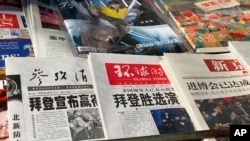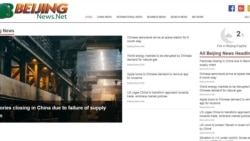A proposal to ban private investment in Chinese news outlets has been viewed by critics as a further attempt by Beijing to control all sectors of the media.
Under draft guidelines posted to the website of China’s National Development and Reform Commission this month, privately owned companies would be prohibited from involvement in media companies, including setting up or running news operations or republishing news produced by foreign outlets.
Political analysts and journalists who have worked for Chinese media say the proposals show Beijing’s ongoing efforts to silence opposition voices.
"The Communist Party is trying to put all news and commentary shows under its own control. All different voices have been eliminated,” Wu Zuolai, a Chinese political commentator, told VOA’s Mandarin Service.
The proposals sparked discussion on Chinese online forums including Zhihu, where many said they believed the regulation would lead to a further decline of media freedom.
“Limiting the role of the media will distort public opinions, and local governments might enforce the rule with extremely strict measures,” one poster on Zhihu said.
Others said the rules could bring an end to “anyone holding a microphone asking for your opinions on the street in the future,” or lead to a need to be more cautious on social media.
China already ranks poorly for media freedom, ranking 177th out of 180 countries, where 1 is the freest, on the annual index by Reporters Without Borders (RSF).
As well as being the leading jailer of journalists, China has state- and privately owned media under “ever-tighter control, while the administration creates more and more obstacles for foreign reporters,” RSF says.
Media investment
While traditional media such as newspapers are funded largely through the public sector, those working in online news rely more on private or foreign investment.
Government funding has been the main source of income for media outlets in China since the 1990s, said Cheng Yizhong, who runs a New York-based news website for the Chinese diaspora in the U.S.
The veteran journalist previously worked for The Beijing News and the Southern Metropolis Daily.
Unlike other countries, China’s media must seek state approval to publish, Cheng told VOA’s Mandarin Service.
“All media in China — books, radio stations, TV stations — must obtain a special approval batch number before they can publish, broadcast and distribute. It’s always the case,” Cheng said.
But as the internet became popular, more people in China moved to accessing news online.
As of December 2020, China had 743 million online news consumers, according to a report released this year by the administrative China Internet Network Information Center.
"There was no public capital investment in the early days of the internet. That was completely new, and the government didn’t know what was going on,” Cheng said, adding the digital media business is nearly entirely dependent on private and foreign capital.
“This has led to great challenges faced by traditional media, so the Communist Party-owned media began to allow some private funding into it,” Cheng said.
The journalist said that when he worked at The Beijing News, around a fifth of the funding came from the private sector. Many of China’s more liberal newspapers also relied on private investors.
But, Cheng said, as the space for commentary reduced, most of the private capital has been withdrawn from media.
Controls tighten
China has long sought to control the media. Its internet regulator on Wednesday released a list of around 1,300 online news services that are the only approved source for reprinting news.
The list includes more outlets and social media accounts than it did in 2016, but the regulator warned that news groups who stray from the approved list will face punishment, Reuters reported.
It also publishes directives telling media how to cover certain events.
Similar directives as far back as 2005 covered private capital in media. When China issued regulations on the culture industry that year, the order excluded investment for “the establishment and operation of news agencies, newspapers, publishing houses, radio stations and television stations.”
The internet regulatory body and the National Development and Reform Commission have also both issued regulations saying that private capital should not be allowed to intervene in the editing process.
Privately owned and independent media often have an editorial firewall to protect their newsrooms from influence from the business side of their operations. But critics say that China’s regulation is based on Beijing having greater control over content.
“The policy has actually never changed,” said Cheng. “It shows that high-level officials in the party never really trust the media. Even in today’s environment, when almost all the media is praising the government, the party still feels uneasy. I think this shows the room for public opinions in China is increasingly shrinking.”
Political commentator Wu said that media today can produce shows on eating, drinking, and having fun, but not something to confront the mainstream voices of the Chinese Communist Party.
A former fellow at the Chinese National Academy of Art, Wu was dismissed for signing Charter 08, a petition calling for greater human rights and democratic freedoms in China. He later moved — to the U.S.
“In the so-called mainstream media platform these days, there’s no negative news,” Wu said. “It’s very difficult to hear what the people have to say now."
This story originated in VOA’s Mandarin Service.






